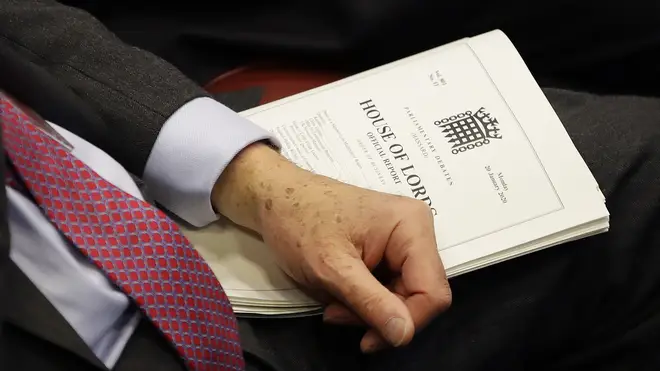
Paul Brand 10am - 12pm
21 October 2020, 00:07

The Government has suffered a significant defeat in the House of Lords over a controversial new Brexit bill critics say breaks international law.
Members backed a "regret" amendment by 395 votes to 169, condemning the provocative move by the Government and warning the UK Internal Market Bill "would undermine the rule of law and damage the reputation of the United Kingdom".
Peers are preparing for a showdown between the unelected chamber and MPs in the House of Commons over the bill, prompting concerns that it could create a "parliamentary ping pong" - where legislation is passed repeatedly between the two Houses.
The Archbishop of Canterbury Justin Welby, former Commons speaker Baroness Boothroyd and Conservative former leader Lord Howard were among many in the Lords to criticise the Bill, which has already cleared the Commons despite opposition from several senior Tory MPs.
Read more: Post-Brexit free trade deal with EU will not happen 'as things stand'
Watch: Alok Sharma tries to explain difference between No Deal and 'Australia-style'
The legislation sets out the way that trade will work between the UK and EU once it leaves the Single Market and Customs Union.
However, it also contains powers which gives ministers the opportunity to override the Brexit divorce deal, something the Government has acknowledged would breach international law.
A compromise reached in the Commons to head off a Tory backbench rebellion, which gives MPs a vote before the powers can be used, has been dismissed by some peers.

Business Minister sets out the difference between an Australia-deal and a No-Deal Brexit.
Lord Judge, a former lord chief justice who proposed the critical "regret" amendment, said: "We cannot resile from the fact that we are breaking the law if this Bill is enacted."
He was supported by opposition frontbencher Lord Stevenson, who hit out at the "egregious clauses" in the Bill.
The Labour peer argued the Government's "pre-emptive action has placed the United Kingdom in the wrong" and damaged Britain's "international reputation as a defender of the rule of law".
He added: "When the history of these troubled months comes to be written it will not be kind to the current Prime Minister and his Cabinet."
Read more: Final warning: Businesses told time ‘running out‘ to get ready for Brexit
Read more: UK tells EU there is 'no basis for negotiations' and halts further trade talks
Liberal Democrat peer Lord Fox said: "We all know this Bill is illegal and we know it flouts important constitutional issues and threatens devolution.
"More than that, we know it has already eroded trust in our institutions and we know it is damaging the reputation of this country, which promotes the rule of law.
"Finally, and perhaps most insidiously, we know that any law that seeks to permit the executive to break laws is morally wrong."
Responding for the Government, Cabinet Office minister Lord True defended the "limited, contingent proposals" in the Bill.
He said: "It does not accept that these safeguard provisions render our country, as has been claimed, an international pariah or justify, as was asserted, murderous actions by others. People are still talking to us."

Brexit: What is an Australia-style trade deal?
The Tory frontbencher added: "The rule of law is a great matter and the integrity of this Union is also a great matter. There is a balance to be struck in the context of these difficult times and proportion to be found.
"We believe that these measures, with all the safeguards, strike that balance without tying the hands of the Government at a critical time.
Read more: Brexit: MPs defeat Lords amendment aimed at protecting UK food standards
"What is potentially proposed is not an armed invasion of another nation, it is a contingent and potential power, subject to safeguards, which the Government has stated it hopes need never be invoked."
Having received its second reading, the Bill faces a continued bumpy ride as it goes forward for detailed line-by-line scrutiny in the Lords.
Later analysis of the voting list revealed a significant Tory rebellion, with 39 Conservative peers defying the Government, including Lord Howard, former chancellors Lord Lamont of Lerwick and Lord Clarke of Nottingham, and Theresa May's former chief of staff Lord Barwell.